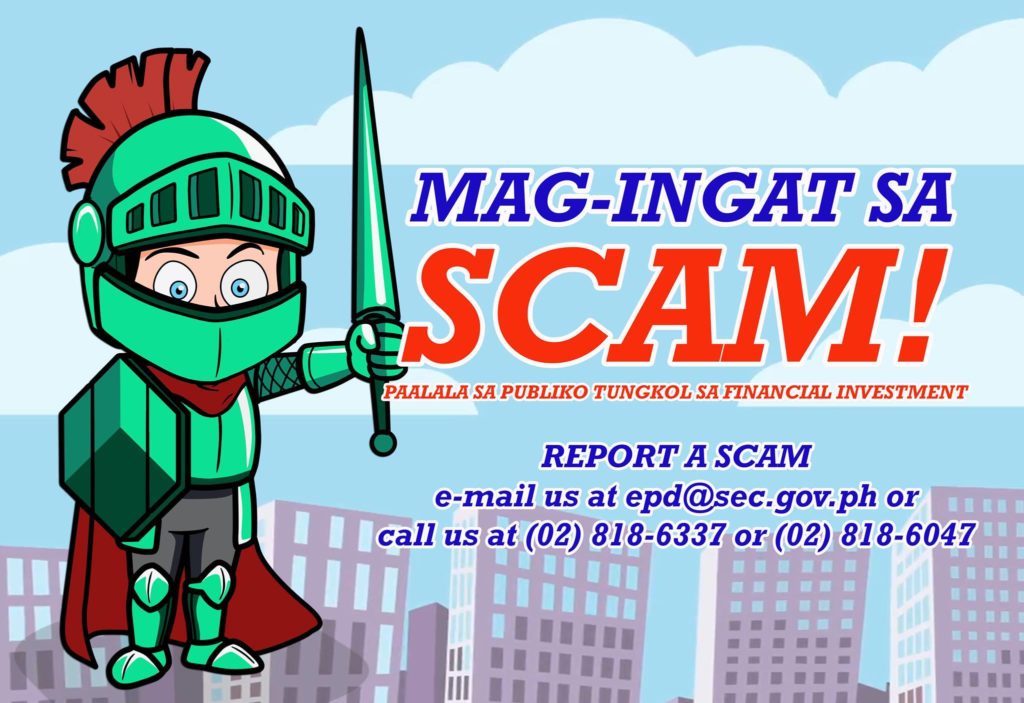
CEBU CITY, Philippines —While authorities are focused on stopping the spread of the coronavirus disease 2019 (COVID-19), several individuals and groups have been enticing the public to invest in fraudulent activities.
In an emailed press release, the Securities and Exchange Commission (SEC) revealed that at least 14 groups have engaged in unauthorized investment-taking activities and other fraudulent activities since the declaration of a national public health emergency following the confirmation of local transmission of the new coronavirus disease in early March.
Read more: BREAKING: Duterte declares state of public health emergency over coronavirus
The SEC cited the activities of individuals and groups using the names of certain foundations or representing themselves as such.
The commission warned the public against a text scam using the name of President Rodrigo R. Duterte. Under the scheme, one would receive a text message stating that he or she won P750,000 from the President: Rodrigo Duterte Charity Foundation through an electronic raffle.
The President: Rodrigo Duterte Charity Foundation was not registered as a corporation, based on the records of the commission.
According to the SEC, the groups involved in unauthorized investment schemes included the Azenzo-Online, which supposedly operates as an independent crowdfunding platform, and the MAGINVESTKA.ONLINE (MIK.O), which purportedly trades bitcoin against the US dollar.
Azenzo-Online offers a “Deposit-Donation, Withdrawal-Blessing” scheme similar to that of Kapa-Community Ministry International. It promises a 30 percent return in as early as five, 10 or 15 days and a 100 percent “Donation Return” after 20 days.
On the other hand, MAGINVESTKA.ONLINE (MIK.O), is operated by a person or persons using the pseudonym “Mag Forex.” It entices the public to invest with a guaranteed 2.0 percent return daily or 200 percent in total for a period of 100 days.
Neither MIK.O nor Azenzo-Online registered as a corporation or partnership. Also, they did not secure prior registration or license to solicit investments from the public, as required under Sections 8 and 12 of Republic Act No. 8799, or the Securities Regulation Code, the commission noted.
Those who act as salesmen, brokers, dealers or agents of fraudulent investment schemes could be held criminally liable and penalized with a maximum fine of P5 million or imprisonment of 21 years or both under the Securities Regulation Code.
Meanwhile, those who engage in text scams also face criminal prosecution for violation of the Revised Penal Code, the Cyber Crime Law and Data Privacy Act.
Read more: LOOK: Bayanihan to Heal as One Act signed by Duterte
In addition, Republic Act No. 11469, or the Bayanihan to Heal as One Act, penalizes those participating in cyber incidents that make use or take advantage of the current crisis to prey on the public through scams, phishing, fraudulent emails, or other similar acts with two-month imprisonment or a maximum fine of P1 million or both.
“We encourage the public to carefully study and examine offers and invitations to participate in schemes promising easy money especially in these difficult times,” SEC Chairperson Emilio Aquino said.
“On our part, the Commission will continue monitoring investment-solicitation activities online and on the ground to stop unscrupulous groups from putting any other burden on Filipinos, especially the vulnerable, amid the COVID-19 pandemic,” he added.
The public may access the full list of companies who are unauthorized to solicit investments on the Advisories page of the SEC official website, www.sec.gov.ph. /dbs